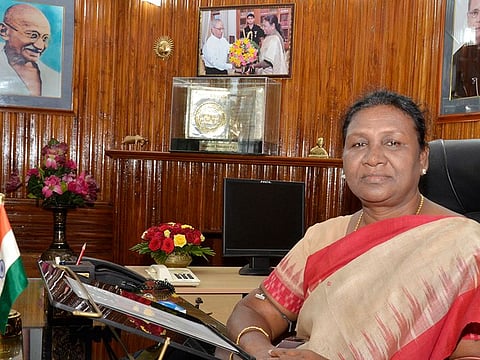Who is Droupadi Murmu — BJP’s candidate for the President of India
The 64-year-old is all set to be the first tribal woman to hold the highest office in land

So, the wait is over. After endless speculation and political commentary on just who would be the presidential candidate of India’s ruling Bharatiya Janata Party (BJP), the name of Droupadi Murmu was finally revealed.
As always there was both an element of surprise and abruptness in the BJP’s decision. The announcement came soon after the country’s opposition presented the name of Yashwant Sinha, India’s former finance minister and ex BJP leader, as its joint candidate for the President of India.
Elections to choose the next President will be held on July 18. The counting will take place on July 21 and the new President will take oath on July 25.
When the eastern India state of Jharkhand was created in 2000 — from the territory that had previously been part of Bihar — Murmu became its first woman Governor (2015-2021).
An efficient administrator, who originally hails from Odisha, she has been a two-term Member of the Legislative Assembly (MLA) from Rairangpur.
Born in Mayurbhanj, in Odisha, she completed her graduation from Rama Devi Women’s College in Bhubhaneswar, Odisha.
After working as an assistant professor at the Shri Aurobindo Integral Education and Research and as a junior assistant in the government of Odisha, Murmu joined the BJP back in 1997.
In the 2000 Odisha assembly polls, she was made minister in the BJD-BJP coalition government. As minister, she handled various portfolios such as transport and commerce, fisheries and animal husbandry till 2004.
Why Murmu?
The choice of Murmu, a grass roots politician, is a masterstroke by the BJP.
A tribal woman leader being catapulted to Rashtrapati Bhavan, official residence of the President of India, signals both inclusion and diversity. India’s ruling party can hope to strengthen its appeal further among the country’s tribal voters.
Since Murmu hails from Odhisa, BJP is sure of getting support from the ruling BJD in the state. Already Odisha Chief Minister Navin Patnaik has welcomed her candidature, indicating support.
The move also makes it hard for Jharkhand Chief Minister and JMM leader Hemant Soren to oppose BJP’s choice, given the nature of tribal politics in his state.
Murmu’s candidature firmly buttresses the BJP narrative that it is a party that appeals to, and promotes leaders, other than those belonging to the upper castes.
Murmu, a tribal leader, belonging to the Adivasi community — one of India’s most marginal groups — is widely seen as a politically safe choice. This is a big boost to BJP’s tribal push.
We will, in all probablity, see Murmu taking oath to protect, defend and preserve the constitution and the law of the land. Once elected, Murmu will be the first President to be born after India’s Independence
The rise of a leader
From a junior assistant in the irrigation and power department in Odisha to (most probably) holding the office of the President of India next month, it has indeed been spectacular journey for Murmu.
If elected, Murmu will be the second woman President of India from July 25, 2022 onwards.
Meanwhile, praising Murmu, Prime Minister Modi took to Twitter to note, "Millions of people, especially those who have experienced poverty and faced hardships, derive great strength from the life of Smt. Droupadi Murmu Ji. Her understanding of policy matters and compassionate nature will greatly benefit our country."
Born in relative poverty in Mayurbhanj, a landlocked, remote district of Odisha, Murmu — against all odds — went on to earn her Bachelor’s degree in Arts from Ramadevi Women’s College in Bhubaneswar.
She served as a junior assistant in the irrigation and power department in the Odisha government.
Murmu went on to become the vice president and later president of BJP’s Scheduled Tribe Morcha in Odisha.
She was elected as the district BJP president of Mayurbhanj in 2010 and re-elected in 2013. The tribal leader was subsequently named as member of the BJP National Executive (ST Morcha).
A scrupulous politician
An upright leader, Murmu was awarded the Nilkanth Award for the Best MLA of the year in 2007 by the Odisha Legislative assembly. With diverse administrative experience, she has handled ministries and is known for being assiduous.
On the personal front, Murmu met with a series of tragedies, having lost both her husband Shyam Charan Murmu and two sons. But if there is one thing that she never allowed to come between her loss in personal life and public duty and her sense of service for the country, it is life’s very many adversities.
Come July, when presidential elections are being held in India, political pundits are unanimous. BJP — and the NDA alliance it helms — commands a solid 48% of the electoral vote.
With even opposition political parties — small, regional and middle-rung — voicing their support for the presidential pick, expect Murmu to make it comfortably to the finish line.
We will, in all probablity, see Murmu taking oath to protect, defend and preserve the constitution and the law of the land. Once elected, Murmu will be the first President to be born after India’s Independence.
Sign up for the Daily Briefing
Get the latest news and updates straight to your inbox







